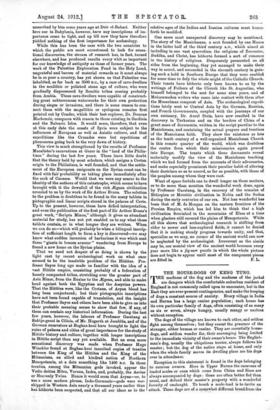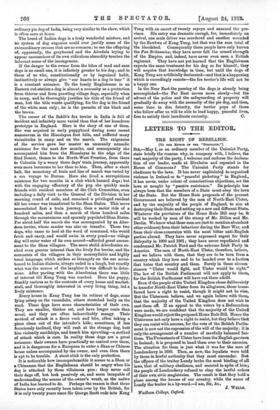THE HOUSE-DOGS OF KENG TUNG.
THE madness of the dog and the madness of the jackal are dangers which the comfortable suburban resident of England is not commonly called upon to encounter, but in the East they are ever-present contingencies, and make the keeping of dogs a constant source of anxiety. Every village in India and Burma has a large canine population; each house has its own particular family of dogs, often consisting of as many as six or seven, always hungry, usually mangy or unclean without exception.
The dogs of the village are known to each other, and seldom fight among themselves ; bat they resent the presence of the stranger, either human or canine. They are essentially house- dogs, and seldom wander far, their scavenging being limited to the immediate vicinity of their owner's house. The English- man's dog, usually the ubiquitous terrier, always follows his master; but the dog of the native stays at home, and only when the whole family moves its dwelling place are his dogs ever in attendance.
Exception to this statement is found in the dogs belonging to caravan owners. Here in Upper Burma the caravans of loaded mules or oxen which come from China and Siam are always accompanied by dogs : these are often better fed than usual, and defend their master's property with a wonderful ferocity of onslaught. To touch a mule-load is to invite an attack. These dogs are of a somewhat different breed from the ordinary pie dog of India, being very similar to the chow, which is often seen at home.
The breed of Indian dogs is a truly wonderful mixture, and no system of dog eugenics could ever justify some of the extraordinary crosses that are so common; to see the offspring of, apparently, the greyhound and the Airedale trying to appear unconscious of its own ridiculous absurdity touches the inherent sense of the incongruous.
If the danger to the owner from the bites of mad and sane dogs is no small one, it is infinitely greater to his dog ; and to those of us who, constitutionally or by ingrained habit, instinctively or always give " our hearts to a dog to tear " it is a constant nuisance. To the lonely Englishman in an Eastern out-station a dog is almost a necessity as a protection from thieves and from prowling village dogs, especially when in camp, and he thoroughly justifies his title of the friend of man, but the title wants qualifying, for the dog is the friend of the white man only ; he is the parasite of the black and the brown.
The career of the Sahib's fox terrier in India is full of incident and infinitely more varied than that of her humdrum
prototype in England. Here is the story of one of them.
She was acquired in early puppyhood during some recent manoeuvres in the Himalayan foot hills, and suffered many
vicissitudes in camp and on the march. The exigencies
of the service gave her master an unusually nomadic existence for the next few months, and consequently she
accompanied him from the Himalayas to the edge of the Sind Desert, thence to the North-West Frontier, from there to Calcutta by a weary three days' train journey, apparently even more boresome to her than to him. Then, after a short halt, the monotony of train and line of march was varied by a sea voyage to Burma. Here she lived a surreptitious existence for two months in a club which banned dogs ; but with the engaging effontery of the pup she quickly made friends with resident members of the Club Committee, even including a daily visit to the General of the Division in her morning round of calls, and remained a privileged resident till her owner was transferred to the Shan States. This move necessitated first a train journey, then a motor ride of a hundred miles, and then a march of three hundred miles through the mountainous and sparsely populated Shan States.
For about half the march she was accompanied by an Aber- deen terrier, whose master was also on transfer. These two dogs, who came to heel at the word of command, who would fetch and carry, and would swim in every pond—no village dog will enter water of its own accord—afforded great amuse- ment to the Shan villagers. The more stolid Aberdonian ex- cited even greater interest than the lively fox terrier, and the comments of the villagers in their monosyllabic and highly tonal language, which strikes so 'strangely on the ear accus- tomed to Indian dialects, always ended in a laugh, but exactly what was the source of the laughter it was difficult to deter- mine. After parting with the Aberdonian there was little of interest till Keng Tung was reached. Here the puppy, frankly curious as to the contents of every house and market- stall, and thoroughly interested in every living thing, led a lively existence.
Every house in Keng Tung has its retinue of dogs, some lying asleep on the verandahs, others stretched lazily on the
road. These dogs have some characteristics of their own. They are smaller, thicker set, and have longer coats than usual, and they are often indescribably mangy. Their method of attack is a fierce rush and bite, often taking a piece clean out of the intruder's hide; sometimes, if less ferociously inclined, they will rush at the strange dog, butt
him violently amidships, and knock him sprawling—a method of attack which is rare. In reality these dogs are - a great nuisance: their owners have practically no control over them, and it is dangerous for a European to enter a Shan or Chinese house unless accompanied by the owner, and even then there is apt to be trouble. A stout stick is the only protection.
It is noticeable how incomprehensible it seems to a Shan or a Chinaman that the Englishman should be angry when his
dog is attacked by these villainous pies : they never call their dogs off, but look passively on, and seem incapable of understanding the source of the owner's wrath, as the native of India has learned to do. Perhaps the reason is that these States have only recently been taken over by the British, for it is only twenty years since Sir George Scott rode into Keng Tung with an escort of twenty sepoys and annexed the pro- vince. His entry was dramatic enough, for, immediately on arrival, one mule driver was murdered and another wounded by the Sawbwa of Keng Tung, but that was the sum total of the bloodshed. Consequently these people have only known the Pax Britannica ; they have never felt the armed strength of the Empire, and, indeed, have never even seen a British regiment. They have not yet learned that the Englishman expects the same treatment for his dog as for himself ; they will acquire that knowledge in time, but until the dogs of Keng Tung are artificially decimated—and that is a happening which is exceedingly remote—the fox terrier's life will not be a happy one.
In the Near East the passing of the dogs is already being accomplished—the Far East moves more slowly—but the advent of the police and the safeguarding of property will gradually do away with the necessity of the pie dog, and then, some time in dim futurity, the terrier pups of those who follow after us will be able to lead happy, peaceful lives, free to satisfy their inordinate curiosity. C.



































 Previous page
Previous page